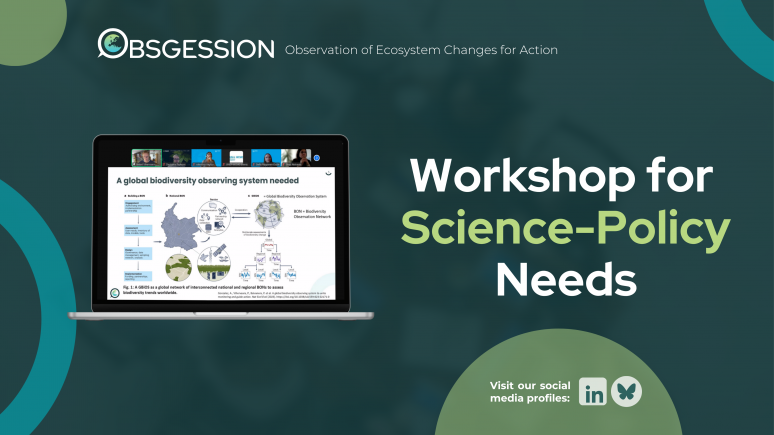
Science meets policy: OBSGESSION Workshop
One of the main objectives of OBSGESSION is to create science-policy links to support EU and international biodiversity directives, goals, and policies through scientific output.
With this goal in mind, on 25th September 2025, UNEP-WCMC, a partner in the OBSGESSION consortium, organised an online Stakeholder Workshop for Science-Policy Needs. The purpose of this workshop was to present the OBSGESSION project to stakeholders from the European Commission, with a focus on how the project can address policy needs and gaps.
In addition to the project overview presented by project coordinator Dr. Petteri Vihervaara (Finnish Environment Institute - Syke), other consortium members showcased important aspects of their work, including achievements, challenges, and overall observations. Dr. Elnaz Neinavaz (University of Twente) shared her insights from the OBSGESSION workshop held at the BioSpace conference in 2025. Dr. Jan-Erik Petersen (European Environment Agency) and Dr. Sander Mücher (Wageningen Environmental Research) presented on European habitat mapping and monitoring, emphasizing the importance of such data for implementing essential legislations such as the New Restoration Regulation and the EU Habitats Directive. Another presentation, by Christian Rossi (Schweizerischer Nationalpark), was dedicated to predicting biodiversity change in the European Alps, a key OBSGESSION pilot.
Stella Piipponen-Doyle (UNEP-WCMC) and Bruno Smets (VITO) collaborated on presenting the EU policy landscape and needs report by OBSGESSION, which outlines the biodiversity policy landscape at the EU level and identifies priority Essential Biodiversity Variables (EBVs) to support EU policy needs, building on previous initiatives such as EuropaBON.
Each presentation was followed by a discussion, giving participants the opportunity to ask key questions and share their perspectives, resources, and practical insights.
Science-policy connectivity is crucial for creating impact and fostering a sustainable future for evidence-based European biodiversity legislation. Dialogues like this maintain momentum and stimulate action and change.